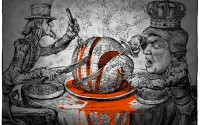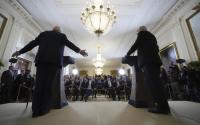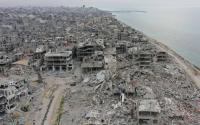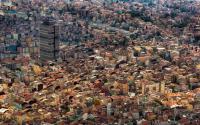22 November 2004David Corn
Days ago, I was speaking with a security consultant freshly back from a trip to Iraq, and I asked for his prognosis. It's terrible, he said. We're not winning. "What about Fallujah?" I inquired. "Hasn't the city been retaken?" "Forget Falluja," this former military officer said. "All you have to know is the road to BIAP cannot be traveled safely."
BIAP--that's the Baghdad International Airport. And since the invasion this six mile stretch of road has been insecure, a hair-raising and dangerous strip of territory. When my friend was making arrangements to travel to Baghdad--he's in search of small-scale reconstruction contracts that can be fulfilled using Iraqi workers--he jokingly told his partners in Iraq that when they pick him up at the airport they should bring an AK-47 he could use. Well, upon his arrival at BIAP (pronounced BYE-APP), he was met by two cars packed with armed bodyguards, and someone did toss him a gun. Then off they went, practically flying down the BIAP road--which he says bears an uncanny resemblance to the Dulles airport road, which meanders through rolling hills of suburbia--at 80 miles per hour. A ride to the airport these days, he was told, can cost up to $6000. (That's not a typo.)
He encountered no trouble. But he had in his mind an ambush that happened a few months back on the BIAP road. Two SUVs were carrying private security contractors who work for Blackwater Security Consulting. (In April, four Blackwater employees were killed in Fallujah; the bodies of two of them were burnt by mobs and hung from a bridge.) A van came flying down an access road and pulled alongside the lead SUV. The door to van opened and machine-gun fire blasted the SUV, which came to a halt. The rear SUV was forced to a stop. A pitched battle ensued, with the Blackwater employees firing back until the fuel tanks of their vehicles exploded. At least three Blackwater employees were killed. My source says he was told four were killed. (There was little media coverage of this incident.) And all the insurgents escaped. "This was in the afternoon!" my friend exclaimed. "Nothing stops them from attacking. Nothing stops them from getting away. Imagine this on the road to Dulles. There must have been at least fifteen of them, pulling off a classic L-ambush. Now what does this tell the Iraqi people? That the Americans cannot secure a small stretch of highway. It runs straight from the airport to the entrance of the Green Zone. And it's not secure. That says it all."
It does--to be polite about it--raise questions. In the aftermath of the Fallujah offensive, military commanders have told reporters that the United States has the insurgents on the run. But the "win" in Fallujah has sparked fighting elsewhere: Mosul, Ramadi, Samarra, Baghdad, and Baqubah. And this "win" has prompted talk that the US military may need an extra 3000 to 5000 troops because securing Fallujah and overseeing reconstruction there will tie up a large number of American soldiers. As The Washington Post reports, senior military officials have predicted a gap in desired troop strength over the next two to three months--which is, of course, the period leading up to and including the scheduled January 30 national assembly elections.
*********
When you're done reading this article,visit David Corn's WEBLOG at www.davidcorn.com. Read recent entries on the budget follies of the Congressional Republicans (and how they tried to get access to your tax records) and whether the Iraq invasion can be considered a humanitarian act.
********
Interim Iraqi leader Ayad Allawi boldly claims the insurgency will be crushed before voting occurs. The Fallujah offensive, according to the US military, did kill 1600 or so enemy fighters. But it also made the military's job harder. A senior military intelligence officer--who, of course, could not speak on the record about such things--told the Post, "Our assessment is that the insurgency remains viable. One of the things we see the insurgents doing is moving to areas where we don't have a lot of presence." Which means the US military will have to stretch itself further.
This is not to dismiss the tough work done by the troops. But the Fallujah operation shows how difficult it is to deal with a rebellion of this sort. And how much (further) damage was done to the United States' image when video footage of an American GI shooting a man lying on the floor of a mosque point blank was broadcast throughout the Arab world and elsewhere? In the meantime, a study conducted by Iraq's Healthy Ministry in conjunction with Norway's Institute for Applied International Studies and the UN Development program, found that acute malnutrition among younger children in Iraq has doubled since the invasion. The study estimated that 400,000 children were suffering from "wasting"--chronic diarrhea and serious protein deficiencies. And the Center for Strategic and International Studies, a Washington think tank that used to have a conservative reputation, has declared that health care in Iraq is worsening at a fast pace.
Iraq remains a mess. And Bush offers only the now all-too-familiar happy-talk. When confronted by a Chilean reporter while in Santiago for a meeting of Pacific Rim nations, Bush said that even opponents of the war have "got to agree with" his opinion that the world is better off with Saddam Hussein in jail. Perhaps. But Bush should ask the families of the "wasting" children of Iraq if they "got to agree." And he offers no idea of what to do in Iraq other than--as John Kerry might mournfully say--more of the same. "The United States of America will stay the course and we will complete the task," he said in Chile. But what precisely is the course? That is, what's his plan? Limp along to elections that have a scintilla of legitimacy and then declare victory and withdraw? Or pour in the greater number of troops--and it may take tens of thousands of more--to do what is necessary to secure the country, even if such action further alienates the nonviolent citizens of Iraq?
The election has not rid Bush of the basic dilemma in Iraq. Fight harder and deal with the consequences of a more aggressive US presence or pull back and acknowledge (explicitly or not) a severe miscalculation was made. While Bush was in Chile, a Republican official who had been briefed by the White House on its efforts to improve relations overseas told the Post, "What they want is to develop and strengthen alliances, but in the direction of US policy. They think Bush has more leverage after the election to engage other countries, but they're not changing their policy. They believe nothing succeeds like success, and they look at the pretty hard-nosed, unilateral foreign policy of the past four years as having succeeded." Iraq is a success? If this is success, then what is the Bush gang going to do for an encore? (Iran, anyone?) In any event, my security consultant friend has this advice: keep an eye on the highway to BIAP. That's where the rhetoric meets the road.
*******
IT REMAINS RELEVANT, ALAS. DON'T FORGET ABOUT DAVID CORN'S BOOK, The Lies of George W. Bush: Mastering the Politics of Deception (Crown Publishers). A NEW YORK TIMES BESTSELLER! An UPDATED and EXPANDED EDITION is NOW AVAILABLE in PAPERBACK. The Washington Post says, "This is a fierce polemic, but it is based on an immense amount of research....[I]t does present a serious case for the president's partisans to answer....Readers can hardly avoid drawing...troubling conclusions from Corn's painstaking indictment." The Los Angeles Times says, "David Corn's The Lies of George W. Bush is as hard-hitting an attack as has been leveled against the current president. He compares what Bush said with the known facts of a given situation and ends up making a persuasive case." The Library Journal says, "Corn chronicles to devastating effect the lies, falsehoods, and misrepresentations....Corn has painstakingly unearthed a bill of particulars against the president that is as damaging as it is thorough." And GEORGE W. BUSH SAYS, "I'd like to tell you I've read [ The Lies of George W. Bush], but that'd be a lie."
For more information and a sample, go to www.davidcorn.com. And see his WEBLOG there
http://www.thenation.com/capitalgames/index.mhtml?bid=3&pid=2023






